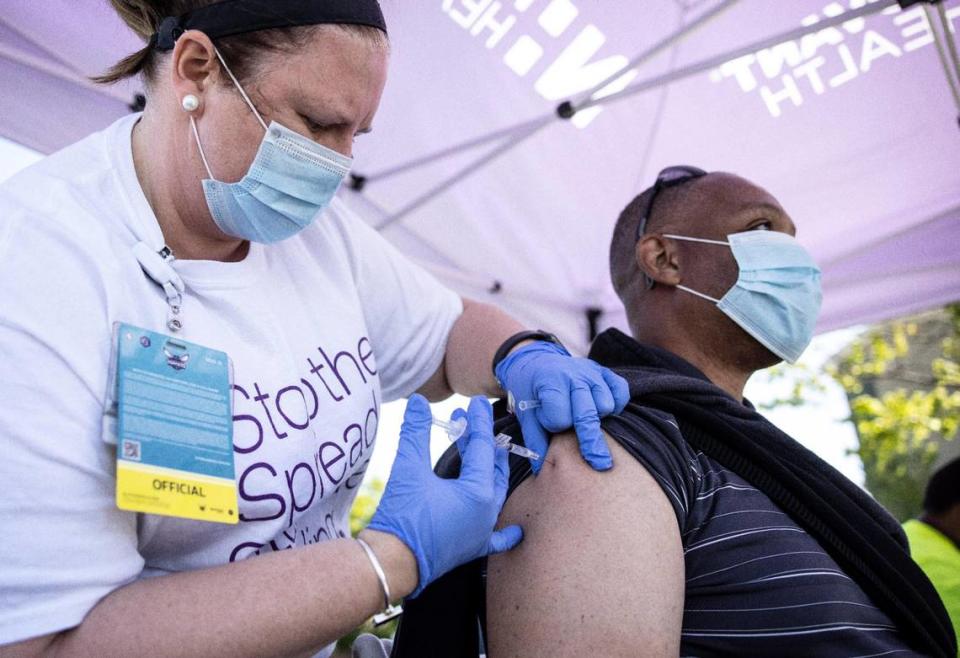A third of Mecklenburg is fully vaccinated. Here’s what that means for herd immunity
More than one-third of Mecklenburg County residents are now fully vaccinated against the coronavirus, according to new state numbers. But local health experts say reaching herd immunity may be unlikely.
As of Monday, 34.4% of Mecklenburg County residents are fully vaccinated, according to state Department of Health and Human Services data.
And 41.6% of county residents are at least partially vaccinated, the numbers show. Similarly, 40.1% of state residents are at least partially vaccinated across North Carolina. Still, that’s far off from the state’s latest vaccination goal of two-thirds of its population.
NC Gov. Roy Cooper has said once two-thirds of state residents are at least partially vaccinated, he will be able to lift all mask requirements. And many statewide pandemic-related restrictions, including limits on business capacity and distancing requirements, are expected to end June 1.
The threshold for herd immunity is likely even higher than two-thirds.
Herd immunity refers to the idea that once a large majority of the population is vaccinated, those people will stunt the spread of the coronavirus and provide protection for people unable or unwilling to get the vaccine.
The threshold for herd immunity could range from 70% to 85%, local health experts have said.
Mecklenburg County is no longer focusing on reaching a specific threshold for herd immunity, county Public Health Director Gibbie Harris said last week. Instead, the county is working on “just getting people vaccinated as quickly as possible,” she said.

‘COVID is going to be around’
Not reaching herd immunity may mean COVID-19 is here to stay long-term, Novant Health infectious disease expert Dr. David Priest said last week.
“The chance to really get enough people vaccinated to eliminate it is becoming smaller and smaller,” he said.
In the future, people may need to get seasonal COVID-19 booster shots each year similar to other respiratory illnesses like the flu, Priest said.
“What’s heartbreaking to me is that we will still see tragedies around COVID, even as the amount of COVID in the community is much lower and we’re getting closer to normal,” Priest said.
People — including those who could have been vaccinated but didn’t get the shot — will still get COVID-19 and die from the infection, he said.
Barriers to vaccination
Still, the county is taking “steps in the right direction” with every person vaccinated, Atrium Health infectious disease expert Dr. Katie Passaretti told the Observer last week.
But while early mass vaccination clinics took a lot of logistical planning, those were the easy steps, she said. Now, many of the people who wanted to get vaccinated were able to get their shots.
Passaretti said she thinks many people are still taking the “wait-and-see” approach on vaccines — waiting to make sure the vaccine is safe before getting the shot. But she emphasized that vaccines are safe and effective, and millions of Americans have already gotten the shot safely.
“I would say: You’ve waited and you’ve seen,” Passaretti said. “It’s time.”
Others are simply never going to get the vaccine, she said, and still others may face barriers to vaccination, including transportation issues or not being able to take time off work to get the shot.
Now, health care experts are trying to make the shots as easy as possible to access, she said.
That includes accepting walk-ins for vaccines and bringing the COVID-19 shots to local stores across Charlotte.
Novant Health launched its latest mobile COVID-19 vaccination initiative in late April, bringing COVID-19 vaccines to groceries stores and other retailers like Lowe’s.
COVID in Mecklenburg
The local vaccination milestone comes as Mecklenburg’s coronavirus metrics show signs of modest progress or stability.
The average COVID-19 positivity rate fell to 6% in the past week, local health officials said. That’s an almost 18% decrease over the last 14 days, but the rate still exceeds the 5% threshold outlined by state health leaders to curb the spread of the virus.
Average hospitalizations have hovered around 170 over the last two weeks, county health data show.
Mecklenburg has logged 111,643 coronavirus cases since the start of the pandemic, NC DHHS reported Monday afternoon. On average, the county is adding 150 new infections daily, a 35% decrease over the last two weeks.
Observer reporter Alison Kuznitz contributed

